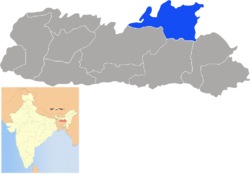Ri-Bhoi District
|
Ri Bhoi District district RiBhoi |
|
|---|---|
| District of Meghalaya | |
 Location of Ri Bhoi District district in Meghalaya |
|
| Country | India |
| State | Meghalaya |
| Headquarters | Nongpoh |
| Government | |
| • Assembly seats | 7 |
| Area | |
| • Total | 2,378 km2 (918 sq mi) |
| Population (2001) | |
| • Total | 192,795 |
| • Density | 81/km2 (210/sq mi) |
| Demographics | |
| • Literacy | 51% |
| Major highways | NH-40 |
| Website | Official website |
Ri Bhoi (IPA: ˌrɪ ˈbɔɪ) is an administrative district in the state of Meghalaya in India. The district headquarters are located at Nongpoh. The district occupies an area of 2378 km² and has a population of 192,795 (as of 2001). As of 2011 it is the second least populous district of Meghalaya (out of 7), after South Garo Hills.
The district was upgraded from subdivisional level to a full-fledged district on 4 June 1992. The new District, was carved out from the erstwhile East Khasi Hills.
The District lies between 90°55’15 to 91°16’ latitude and 25°40’ to 25°21’ longitude. It is bounded on the north by Kamrup District and on the East by Jaintia Hills and Karbi Anglong District of Assam and on the West by West Khasi Hills District. There are three C and RD Blocks and one administrative unit at Patharkhmah, and the number of villages is 561. Ri Bhoi District covers an area of 2448 km².
The headquarters of the District is at Nongpoh located at 53 km away from the state capital Shillong and 50 km from Guwahati. This District is characterized by rugged and irregular land surface. It includes a series of hill ranges which gradually sloped towards the north and finally joins the Brahmaputra Valley. The important rivers flowing through this region includes the Umtrew, Umsiang, Umran and Umiam rivers.
In 1981 Ri-Bhoi district became home to the Nongkhyllem Wildlife Sanctuary, which has an area of 29 km2 (11.2 sq mi).
In 2006 the Ministry of Panchayati Raj named Ri-Bhoi one of the country's 250 most backward districts (out of a total of 640). It is one of the three districts in Meghalaya currently receiving funds from the Backward Regions Grant Fund Programme (BRGF).
...
Wikipedia
